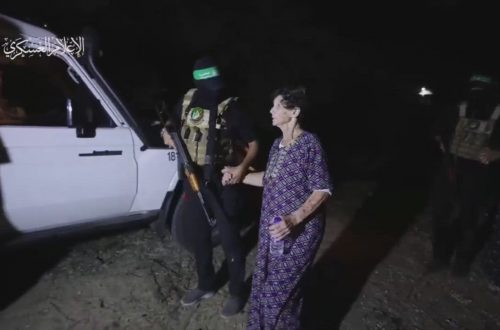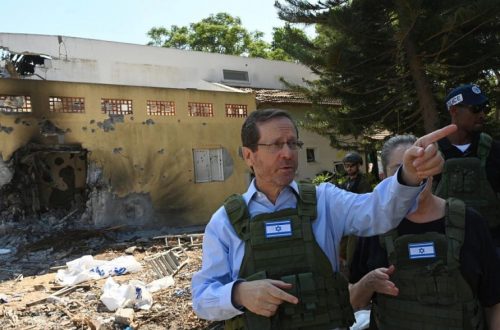First off, I should make clear that I do not blame the Luton Islamic Centre for the terrorist attack in Stockholm by one of their former congregants. They are opponents of terrorism in the United Kingdom. It looks as if he spent a relatively short – although eventful – period at the Luton Islamic Centre, in any case.
More importantly, I accept that they did not, in fact, realise that Abdulwahab had become an Al Qadaist. Accordingly, they did not report him to the police. This is precisely why it is such a great mistake to treat them as part of the defence against jihadist terrorism.
On the Luton Islamic Centre’s own account of their relationship with the Stockholm bomber, the evidence that he was a takfiri – the branch of Salafism identified exclusively with Al Qaeda and jihadist terrorism – was right in front of their eyes. They did not see it. Why was that?
Here’s what they say:
The alleged perpetrator, Taymour Abdul Wahab attended our mosque for a brief period of time during the month of Ramadan, 2006. Prior to this, we had never seen him, or heard of him. Whilst attending our mosque, he started preaching extremist ideas to members of our congregation. The mosque committee advised him of the error of his ways, and he was told not to preach extremist ideas in the mosque. Unfortunately he did not take heed of our advice and continued his preaching. Three weeks after he first attended the mosque, we decided to publicly refute his views. This was done after the morning prayers which were attended by over 100 worshippers. Taymour, then stormed out of the mosque, and we never heard from him again.
One of the questions that has been raised is why the police were not informed. Firstly Taymour, never preached violent radicalisation, his preaching was centred around two issues; declaring the leaders of the Muslim states to be apostates, and secondly harsh criticism of the Muslim scholars. Such views do not necessarily lead to violent radicalisation, they are not illegal, and we would probably be accused of wasting police time if we reported them.
Secondly, our masjid has been very effective in refuting violent extremism; many former extremists have now joined us in promoting the community harmony. If we were to report every individual who held extremist views to the police, our strategy in tackling extremism would fail. Rather than come to us and give us the opportunity to clarify their misconceptions, these individuals would go underground and associate only with like minded people.
Thirdly, from a civil liberties perspective, should one be reported to the police just for holding extremists views? No doubt we have a duty to report crimes or planned crimes to the police, but are we now required to be’ thought police’. If everyone started informing the police about others who have extremist views (such as the 800,000 who voted BNP at the last election) the police would never get any work done.
Fourthly, groups such as al-Muhaajiroon are constantly espousing extremist views, yet when members of our mosque confronted them, we were threatened with arrest. In fact the police even prevented us from distributing anti-extremist literature near their stall.
There is more, and you should read their piece in full. They go on to declare that the EDL and Al Muhajiroun are “two sides of the same coin”, which I think is a fair point to make.
Let’s start with the evidence of Abdulwahab’s conduct. He clearly made a big impact on the mosque in a short period. Specifically he declared the leaders of Muslim states to be apostates.
A person who declares the leaders of Muslim states “apostates” is a takfiri. A person who practices takfir is doing something hugely controversial, theologically. It is really only Salafi Jihadis, that is those aligned with Al Qaeda, who do it. The orthodox position on a declaration of apostasy is that it can only be done by a body of the most learned clergy, after proper deliberation and process. This is a serious matter. We are talking not simply of a death sentence: but an excommunication.
Abdulwahab turned that on the head. He denied the authority of the ulema, both implicitly by usurping their right to declare takfir, and explicitly in the criticism of the scholars. He did so in public, attempting to recruit others to his cause.
So here we have a takfiri, preaching against leaders of Muslim states, declaring them apostates, questioning the authority of the ulema. This is the profile of an Al Qaeda supporter. Why then did they not report them?
The Luton Islamic Centre gives a number of explanations. The first is this:
Such views do not necessarily lead to violent radicalisation, they are not illegal, and we would probably be accused of wasting police time if we reported them.
I disagree with the first point, am agnostic on the second, and am concerned by the final one. Abdulwahab’s views are indicative of “violent radicalisation” because a declaration of apostasy means that these non-Muslim (and therefore illegitimate) leaders ought to be overthrown by non-apostate Muslims. The expression of those views may or may not be illegal, depending on what precisely Abdulwahab said. We are told that he “never preached violent radicalisation”, but I would really like to know more. Did he set out the consequences of the the declaration of takfir to any extent? What was his tone? What words did he use?
If the police really would be uninterested in a strange man preaching Al Qaeda inspired theology, and then storming off when confronted, then that is a very sorry state of affairs. Perhaps being threatened with arrest for arguing against Al Muhajiroun or being prevented from setting up their own stall to oppose them has left them with the impression that the police don’t care.
The main thrust of the Luton Islamic Centre’s argument is this. They are wholly convinced that they are in the front line of the battle against violent extremism. I’m certain that this belief is sincerely held. It has been encouraged by the likes of Bob Lambert, and is shared by senior Home Office officials, like Charles Farr.
It is absolutely wrong. The notion that Muslims who have become Al Qaedaists can only be wooed back from the brink by Salafis whose theology differs from Al Qaeda only in the question of the authority of the Saudi ulema is a false one. It assumes that extremism is a default position for Muslims. In fact, those who become involved in extreme and jihadist politics are often intelligent and intellectually inquisitive people whose politics can change remarkably when exposed to liberal democratic views.
It is symptomatic of the problem we face, not amongst Muslims, but in the corridors of Whitehall, that those who have left jihadist politics behind them and promote a secular liberal and democratic politics instead are seen as ‘inauthentic’. Yet, in October, a convicted terrorist in Amsterdam publicly denounced the jihadist world view, at length, having been persuaded of the error of his ways by the likes of Charles Darwin and Karl Popper. We would never praise the British National Party for wooing neo Nazi terrorists into their ranks, encouraging them to put their efforts into spreading racism by “non violent” means. We don’t treat white racists as if they’re lost to our society. So why do we take that approach with Muslims?
I just want to pause here for a second to meet the objection that the Luton Islamic Centre is not the equivalent of the British National Party. Just take a moment to read about some of the publications that this institution carries on its website. Vicious attacks on Shias who are compared to the Jews, theological promises of the destruction of the Jews who are repeatedly defamed, support for the whipping of a rape victim, and so on.
And it isn’t only the Shia who the Luton Islamic Centre have it in for. No. They also regard the following as “deviated sects”: The Brelwies, The Qadianiyyah, The Sufis, The Khawaarij, The Qutubees, The Suroorees, Jamaa’atut-Tableegh, Hizbut-Tahreer, The Takfeeris, The Murji’ah, Al-Muhaajiroun, The Qur’aaniyoon, Deviation And Deviant Groups, Hizbiyyah (Being Partizan).
With some of those: fair enough. But that’s pretty much every Muslim in the world, except them. It isn’t a declaration of takfir against the world. But it is extreme sectarianism.
Here’s the thing. The main argument for treating extreme Salafis as our defence against Al Qaeda is that the closeness of their views to the sort of people who commit acts of terrorism gives them a certain common ground with the jihadists, which they can use to ‘talk them down’. That may happen. However, what happens when a person is persuaded of the rightness of the theology he hears at the Luton Islamic Centre, but then takes the one small further step, towards takfirism and a denial of the legitimacy of leaders of all Muslim states? Not everybody is persuaded by the counter-argument. Abdulwahab was not.
And what about all those who ‘merely’ become Salafis, and separate from society, hating Gays, Jews, Shias, and dreaming of a state which executes the antisocial element? Such views are obnoxious, but people are entitled to hold them in a free society. However, to encourage actively the propagation of these views, in the hope that a couple of jihadists will be persuaded to await the Caliph’s call before launching jihad is a very poor social policy indeed. It handicaps us from criticising groups like the English Defence League and the British National Party, if groups espousing equally hateful views are praised and encouraged. They should be opposed, by Muslims and non Muslims: and they are.
The Luton Islamic Centre asks, rhetorically, whether “the 800,000 who voted BNP at the last election” should be reported to the police. as extremists. They should not be. However, a BNP member who turns up at a public meeting screaming about the “coming Race War” when “the Race Traitors who have used us will be shot” most certainly ought to be. It is precisely these people who are the most likely go on to commit attacks against cultural and ethnic minorities. We have ourselves to blame if we do not read those warning signs. Similarly, it is only those who turn up at Mosques, declaring the leaders of Muslim majority countries “apostates” and trying to recruit support who are likely to go on to become suicide bombers. As we have seen.
The final reason that the Luton Islamic Centre gives for not reporting to the police, is that they say that to do so would prevent them candidly from confronting the views of takfiris. They are, in effect, asking for a form of priest-penitent privilege. But there is no such right to secrecy in English law. There should not be one in practice, either.
I think it quite possible that the Luton Islamic Centre did not in fact realise that their takfiri preacher was recruiting for Al Qaeda. The arrival of Abdulwahab in their mosque was evidently a very exciting and memorable event, which must have led to high passions on all sides. However, I believe that they saw it as essentially a theological dispute: a lost lamb, gone astray. They should have thought: who is he going to kill, how, and when? But they evidently did not.
For all these reasons, I hope that Luton Islamic Centre appreciates that they are not a significant part of the solution to jihadism. It is mistaken for policymakers to believe that they can perform such a role, effectively. It would be a terrible error if extreme Salafi politics and theology is being promoted in the mistaken believe that this will enhance community cohesion.
There’s a caveat to all this. It is possible that Luton Islamic Centre does, in fact, privately tip off the police when the likes of Abdulwahab walk through their doors. It is also possible that, even armed with this information, the police messed up. We’re unlikely to know, and that is as it should be.


